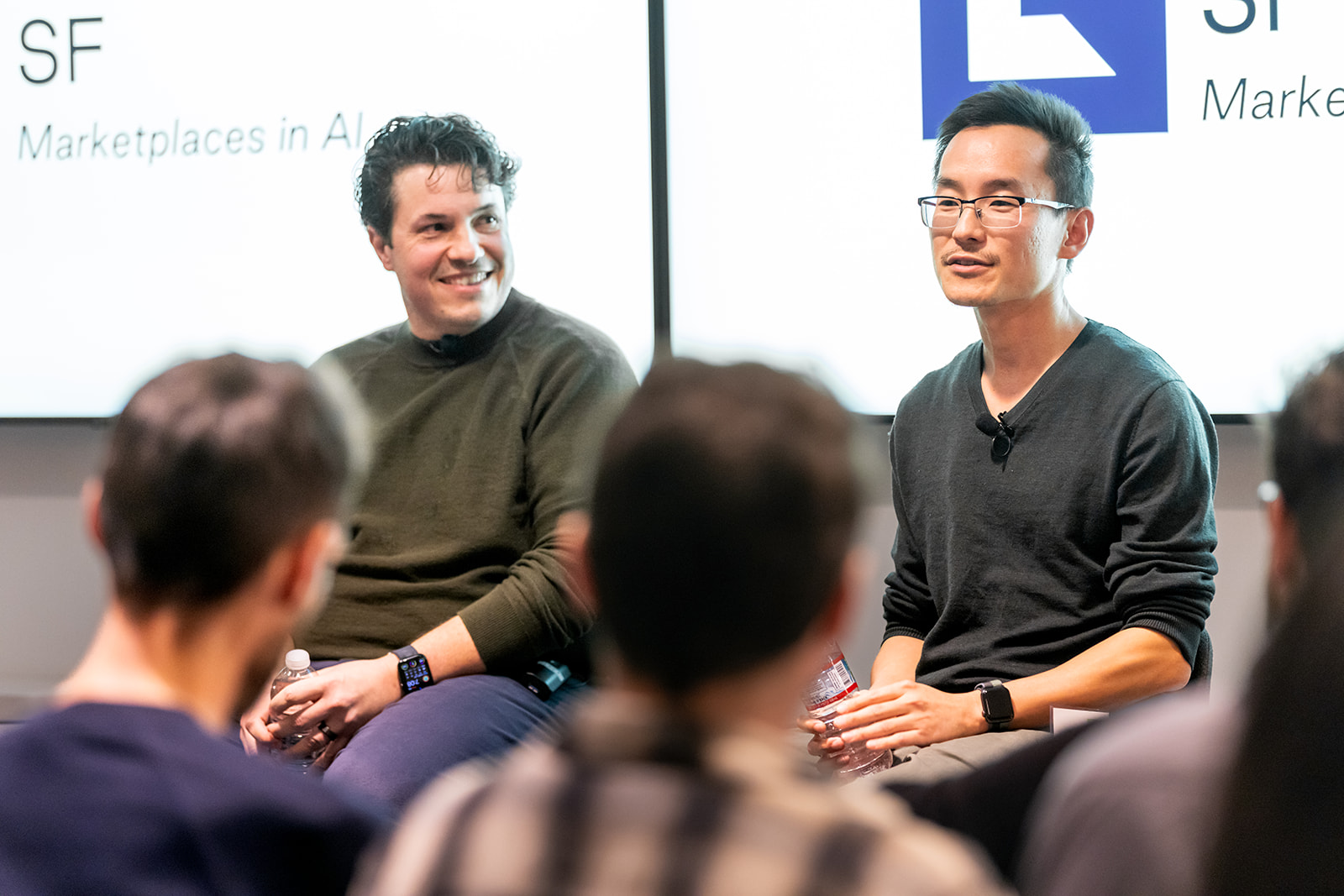01/25/2024
Consumer
Generative SF: Marketplaces in AI Edition
How Instacart and Faire use AI to boost productivity and better serve their customers.

How are AI tools like ChatGPT and LLMs changing the way online marketplaces do business? To answer that question and more, leaders from two of the biggest B2B and B2C marketplaces, Faire* and Instacart, joined us at our latest Generative SF meetup.
Lightspeed consumer partner Sydney Sykes moderated a discussion with Instacart Co-founder Brandon Leonardo and Faire’s Head of Data Chen Peng. They covered everything from AI chatbots and how they integrate them into their daily workflows today to increase productivity, to the future benefits Gen AI is likely to deliver.
A few takeaways from the discussion:
- Using Gen AI to accelerate your mission
One of the early use cases for ChatGPT was people asking for help with meal planning — which fit perfectly with Instacart’s mission of giving people access to the food they love. Much of Instacart’s business has long been powered by AI and ML, and now with Generative AI, the company can use these new tools to tackle the deepest, hardest problems related to food.
Faire, which already had made heavy investment in various machine learning systems over the years, saw Gen AI as a potential accelerator instead of existential threat for their business, and took a thoughtful approach in learning and exploring early use cases. According to Chen, the AI features you develop should aim to enhance internal productivity or address the needs of your external customers. “Avoid implementing AI simply for its allure, especially if it doesn’t effectively solve a real problem,” he said.
- Gen AI becomes integral to operations
Faire is now in the process of leveraging Gen AI to enhance product descriptions, generate more accurate attribute tags, improve image quality, and make the shopping experience more personalized for retailers. “The core mission of a marketplace model is to match demand with supply,” noted Chen. “Any Gen AI use cases that can make that process more efficient and effective is very exciting to us.” In addition, Faire is also empowering employees to leverage LLM to improve internal workflows, such as drafting and summarizing documents.
Instacart is turning to Gen AI to enhance its consumer product and drive efficiencies internally, said Brandon. Examples include a tool for their legal department to speed up approvals. Another use case is to improve customer care by providing a better chat experience. The company has also built an internal chatbot called Ava that employees can use to query internal company resources, such as Confluence and Slack.
“You get these Slack threads that are 144 comments long, and you can type ‘@Ava summarize’ and it gives you a summary of what happened,” he said. “That is probably the most useful thing. I use it all day long.”
- The gains in coding productivity are dramatic
Both Brandon and Chen acknowledged the big impact Copilot and ChatGPT have had on their developers’ ability to ship code more quickly and efficiently. The ability of these tools to auto-fill common code snippets and automate repetitive and time-consuming programming tasks has in some instances boosted developer productivity by as much as 20 percent.
Chen said that Faire was seeing promising early results as well.
“We are now asking engineers and data scientists to leverage Github Copilot and ChatGPT in their day to day workflows,” he added. “We have also seen encouraging enhancement of dev productivity similar to what Brandon mentioned.”
- They’ve only just scratched the surface
Brandon said Instacart is deploying Gen AI in lots of little ways that are invisible to customers but end up having a big cumulative impact — like the ability to generate food photos and recipes to provide meal planning inspiration in the Instacart app, clean up grammar and automatically translate languages in customer-facing chatbots, or even do a better job of suggesting wine and food pairings.
Evaluating search relevance is another area where Faire plans to use LLMs extensively, Chen noted. Historically the company mainly relied on manual efforts to audit the relevance of search results. “More recently we have been able to use GPT to achieve similar relevancy tagging accuracy with much lower cost and higher measurement frequency,” he said.
- Gen AI makes you better at things you’re already good at, but it won’t magically transform your business
Brandon foresees a “massive Cambrian explosion” of personalized AI apps to automate workflows and help people be more efficient. He said Gen AI will also make it easier for businesses to identify and reach the right audiences, which is vital in an increasingly crowded market. But it won’t change the fundamentals of operating a successful business.
“At the end of the day, what will help you win will be how fanatical you are about caring for your customer and the problems you’re trying to solve,” he said. “The more obsessed you are, and the better you figure out how to use these tools to achieve that, the more successful you will be.”
Chen agreed.
“Some well respected industry leader once said that people tend to focus too much energy on what’s changing, but not enough attention to the things that never change,” he said. “Customers will always want better prices, greater selection, and more convenient and reliable services. Those will never change. So our focus is on using Gen AI to deliver these things in an even better way to our customers.”
Interested in attending a Generative event? Sign up here to receive notifications about future meetups, and be sure to listen to the Generative Now podcast, where AI builders talk about how they’re creating the future.
*A Lightspeed portfolio company


